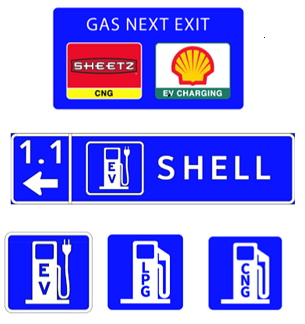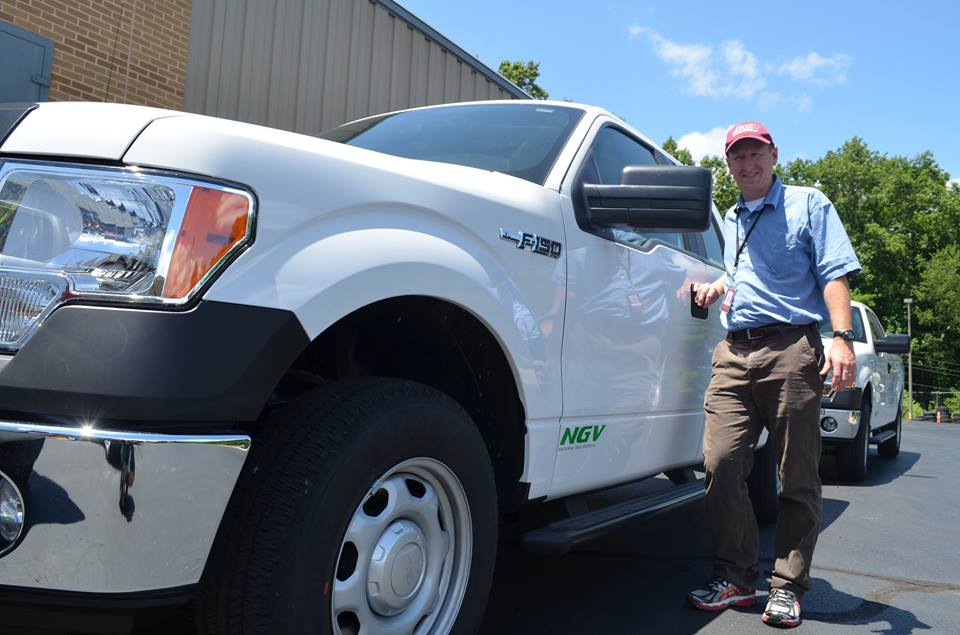Virginia supports the advancement of sustainable transportation and seeks opportunities to support a variety of alternative fuel projects across the Commonwealth. These fuels include biodiesel, ethanol, propane/LPG, compressed natural gas (CNG), and electricity.
The Commonwealth actively works with partners to expand the state's usage of alternative vehicles across its fleet. During the 2011 General Assembly, a bill was introduced and passed directing the establishment of a plan providing for the replacement of state-owned or operated vehicles with vehicles that operate using alternative fuel, in order to support expansion of alternative fuel vehicle markets and to reduce Virginia’s dependence on foreign oil.
To accomplish this, the Commonwealth worked through a Public-Private (PPEA) partnership, to investigate the feasibility of such a plan. As a result of the PPEA, contracts have been awarded to Clean Energy Fuels for a natural gas (CNG) and Alliance AutoGas, a network managed by its parent company Blossman Gas, Inc., for propane autogas (LPG) solutions. Both contracts include provisions for fueling infrastructure, statewide fuel pricing and vehicle conversions.
Virginia now uses these partnerships to provide incenctives for State and local government fleet vehicle conversions, through the Virginia Alternative Fuels Fleet Vehicle Incentive.
The Commonwealth also offers incentives for the conversion of selected fleet vehicles of State agencies and local governments in specific air quality non-attainment, ozone attainment, and/or maintenance areas. For more information, click Virginia Alternative Fuels Fleet Vehicle Incentive. Supported by Congestion Mitigation and Air Quality (CMAQ) Funds, fleets may be reimbursed for incremental costs to transition to alternative fuels such as electricity, natural gas (CNG), or propane autogas (LPG). Reimbursements can be up to an average of $10,000 for the incremental cost of new vehicles or reasonable aftermarket conversions.
Virginia Energy is supported on Alternative Fuels/Vehicles initiatives by Virginia Clean Cities (VCC) /James Madison University. The Clean Cities program is sponsored by the U.S. Department of Energy in accordance with the Energy Policy Act of 1992, to reduce dependence on imported petroleum products, by promoting the use of alternative fuels and vehicles use in the transportation sector.
VCC, based in Harrisonburg, works to promote non-polluting, non-petroleum alternative fuels and vehicles to increase U.S. national energy security; improve air quality and public health in the Commonwealth of Virginia; and develop resulting economic, academic, and research opportunities in the Commonwealth of Virginia. VCC regularly offers alternative fuels training, produces alternative fueling locator maps, surveys Virginia's fleet vehicles adoptions, follows biofuels production in the state, and conducts alternative vehicle road shows. To get information about the activities and projects of VCC, please visit their website here »
Electric Vehicle Charging Station Signage

Highway and directional signage for Electric Vehicle Charging / Alternative Fuels messages must be certified by Virginia Energy, under Virginia's Integrated Directional Signing Program (IDSP). Learn more here »
Highway and directional signage for Electric Vehicle Charging / Alternative Fuels messages must be certified by Virginia Energy, under Virginia's Integrated Directional Signing Program (IDSP). Learn more here »
Under Virginia’s IDSP, an entity wishing to display EV Charging / Alternative Fuels messages on IDSP highway signs must complete the Signing Request Form HERE, meet the minimum Participant Criteria, and submit this request for certification to renewableefficiency@virginia.energy.gov.
Electric Vehicles
Hybrid electric vehicles (HEVs), plug-in hybrid electric vehicles (PHEVs), and all-electric vehicles (EVs)-also called electric drive vehicles collectively-use electricity either as their primary fuel or to improve the efficiency of conventional vehicle designs.
Hybrid electric vehicles (HEVs) are powered by an internal combustion engine or other propulsion source that can be run on conventional or alternative fuel and an electric motor that uses energy stored in a battery. HEVs combine the benefits of high fuel economy and low emissions with the power and range of conventional vehicles.
A wide variety of hybrid electric vehicles are currently available Although HEVs are often more expensive than similar conventional vehicles, some cost may be recovered through state incentives .
All-electric vehicles (EVs) use a battery to store the electrical energy that powers the motor. EVs are sometimes referred to as battery electric vehicles (BEVs). EV batteries are charged by plugging the vehicle into an electric power source. Although most U.S. electricity production contributes to air pollution, the U.S. Environmental Protection Agency categorizes all-electric vehicles as zero-emission vehicles because they produce no direct exhaust or emissions. Because EVs use no other fuel, widespread use of these vehicles could dramatically reduce petroleum consumption.
Plug-in hybrid electric vehicles (PHEVs) use batteries to power an electric motor and use another fuel, such as gasoline or diesel, to power an internal combustion engine or other propulsion source. Using electricity from the grid to run the vehicle some or all of the time reduces operating costs and petroleum consumption, relative to conventional vehicles. PHEVs might also produce lower levels of emissions, depending on the electricity source.
Find Alternative Fueling Stations here »
Biodiesel
Biodiesel is a liquid fuel made up of fatty acid alkyl esters, fatty acid methyl esters (FAME), or long-chain mono alkyl esters. It is produced from renewable sources such as new and used vegetable oils and animal fats and is a cleaner-burning replacement for petroleum-based diesel fuel. It is nontoxic and biodegradable.
Virginia has a tax credit for Biodiesel and Green Diesel production.
If your business produces up to 2 million gallons of biodiesel or green diesel per year, you may qualify for a $0.01 per gallon income tax credit, up to $5,000 annually for the first 3 years of production. The credit can be used against individual or corporate income tax and is transferable and can be carried forward for 3 years. Learn more at the Virginia Department of Taxation website.
To apply and get certified, please contact our Transportation Lead: edward.cronin@energy.virginia.gov
Additional Resources
Find Alternative Fueling Stations here
Information on Making the Switch to Biodiesel
Compressed Natural Gas

Natural gas is a mixture of hydrocarbons, primarily methane which is a relatively unreactive hydrocarbon. Natural gas delivered through the pipeline also contains ethane and propane (hydrocarbons) and other gases (i.e., nitrogen, helium, carbon dioxide, hydrogen sulfide, and water vapor). Natural gas can be produced from gas wells or as a result of crude oil production. Because of the gaseous nature of natural gas, it must be stored onboard a vehicle in either a compressed gaseous state (CNG) or a in a liquefied state (LNG). End users for natural gas include all economic sectors: residential, commercial, industrial, and transportation.
Natural gas is one of the cleanest burning alternative fuels available and offers a number of advantages over gasoline. In light-duty applications, air exhaust emissions from natural gas vehicles are much lower than those from gasoline-powered vehicles. In addition, smog-producing gases, such as carbon monoxide and nitrogen oxides, are reduced by more than 90% and 60%, respectively and carbon dioxide, a greenhouse gas, is reduced by 30%-40%.
For heavy-duty and medium-duty applications, natural gas engines have demonstrated more than 90% reduction of CO and particulate matter and more than 50% reduction of NOx relative to commercial diesel engines.
For more information about CNG vehicle use, please visit the Virginia Clean Cities web page.
Find Alternative Fueling Stations here »
Ethanol
Virginia follows the advancement of alternative fuels and looks for opportunities to support ethanol projects. While the use of E85 is gaining momentum, the industry still faces significant challenges. With respect to E85 availability in Virginia, the primary barriers are associated with the availability and cost of the product. These barriers are gradually being overcome through advancements in technology, engineering research/application, and market acceptance/penetration.
In order to help overcome these barriers, the Commonwealth, in collaboration with various public and private alternative fuel stakeholders is leading a project that calls for the installation of E85 fuel sites near the Commonwealth's population centers. The project is being funded through state and private contributions and a U.S. Department of Energy (DOE) Grant. The project will provide up to 12 retail stations for E-85 fuel along the I-95, I-64 Crescent Corridor that traverses Virginia, Maryland, and the District of Columbia in order to make the alternative fuel available to an estimated 15,000 public and private Flex Fuel Vehicles and displace up to 530,000 gallons of petroleum gasoline on a monthly basis. The project will be integrated with E-85 fueling infrastructure construction plans of state and federal government fleet managers. Project partners include GM, selected fuel suppliers and distributors, three Clean Cities Coalitions, three State Energy Offices, fleet managers, divisions of federal, state and local government, non-profits, and civilian and military segments of the U.S. Armed Services.
Resources:
American Coalition for Ethanol - The grassroots voice of the ethanol industry dedicated to the use and production of ethanol.
Renewable Fuels Association - Promotes policies, regulations and research and development initiatives that will lead to the increased production and use of ethanol.
Find Alternative Fueling Stations here »
Propane
Propane autogas, also referred to as liquefied petroleum gas (LPG), is the most widely used alternative fuel in the worked, with more than 17 million autogas vehicles on the roads today. Autogas vehicles help meet reduced emissions and domestic energy goals while providing a driving and fueling experience very similar to that of gasoline vehicles.
